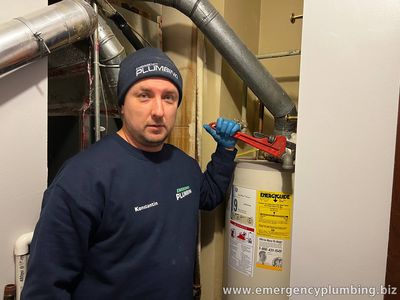10:45 PM Preparing your water heater for the cold season | |
Preparing Your Water Heater for the Cold Season
As the colder months approach, it's essential to ensure that your water heater is ready to meet the demands of winter. A well-maintained water heater not only provides you with a steady supply of hot water but also helps you save on energy costs. Here are some important steps to get your water heater ready for the cold season:
**1. Insulate Your Water Heater:** - Consider adding an insulating blanket or jacket to your water heater. This helps reduce heat loss, making your water heater more energy-efficient, especially in colder temperatures.
**2. Check for Leaks:** - Inspect your water heater and the surrounding area for any signs of leaks. Even a small leak can lead to energy and water wastage. If you notice any leaks, have them repaired promptly.
**3. Flush the Tank:** - Sediment can accumulate at the bottom of the water heater tank over time, reducing its efficiency. Drain and flush the tank to remove sediment buildup. Follow the manufacturer's instructions or consider hiring a professional for this task.
**4. Test the Pressure Relief Valve:** - The pressure relief valve is a crucial safety feature. Test it by lifting the valve's lever slightly to ensure that it releases water. If it doesn't, or if it continues to drip afterward, it may need to be replaced.
**5. Inspect the Anode Rod:** - The anode rod helps prevent corrosion inside the tank. Inspect it for signs of wear and replace it if necessary. Typically, these rods should be checked annually.
**6. Adjust the Temperature Setting:** - Lowering the temperature on your water heater during the winter can help reduce energy consumption. A temperature of around 120°F (49°C) is often recommended for optimal efficiency and safety.
**7. Inspect the Ventilation:** - Ensure that the ventilation around your water heater is unobstructed. Proper ventilation is essential for safe operation. If you have a gas water heater, make sure there are no drafts near the pilot light.
**8. Consider Insulating Pipes:** - To prevent heat loss from the pipes leading to and from the water heater, you can insulate them with foam pipe insulation. This can help maintain hot water temperatures and reduce energy use.
**9. Schedule Professional Maintenance:** - Consider scheduling a professional maintenance checkup for your water heater. A qualified technician can thoroughly inspect the system, make necessary adjustments, and ensure it's operating at peak efficiency.
**10. Be Prepared for Emergencies:** - Familiarize yourself with the location of the water heater's shut-off valve. In case of extreme cold, power outages, or other emergencies, knowing how to turn off the water heater can prevent damage. By taking these proactive steps to prepare your water heater for the cold season, you can ensure a reliable supply of hot water and potentially reduce your energy bills.
Attachments: Image 1 | |
⏰ Dispatcher support 24/7
📞 224-754-1984CALL ☎ Subscribe 👆 FORUM 🗣
North Shore, Northwest suburbs of Chicago, IL
Next & Previous posts
| Total comments: 0 | |


